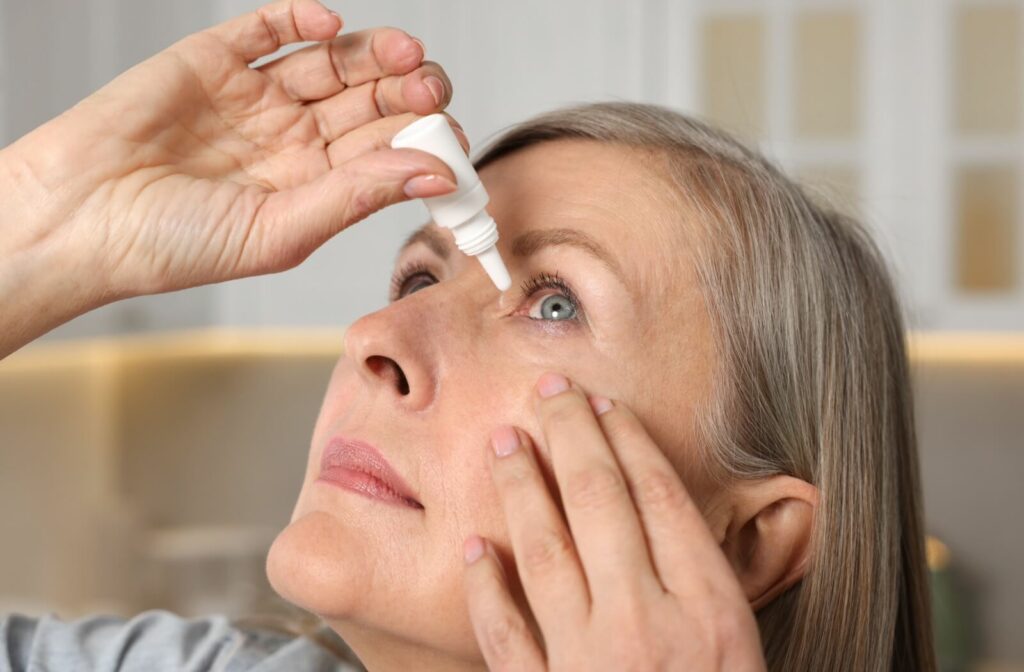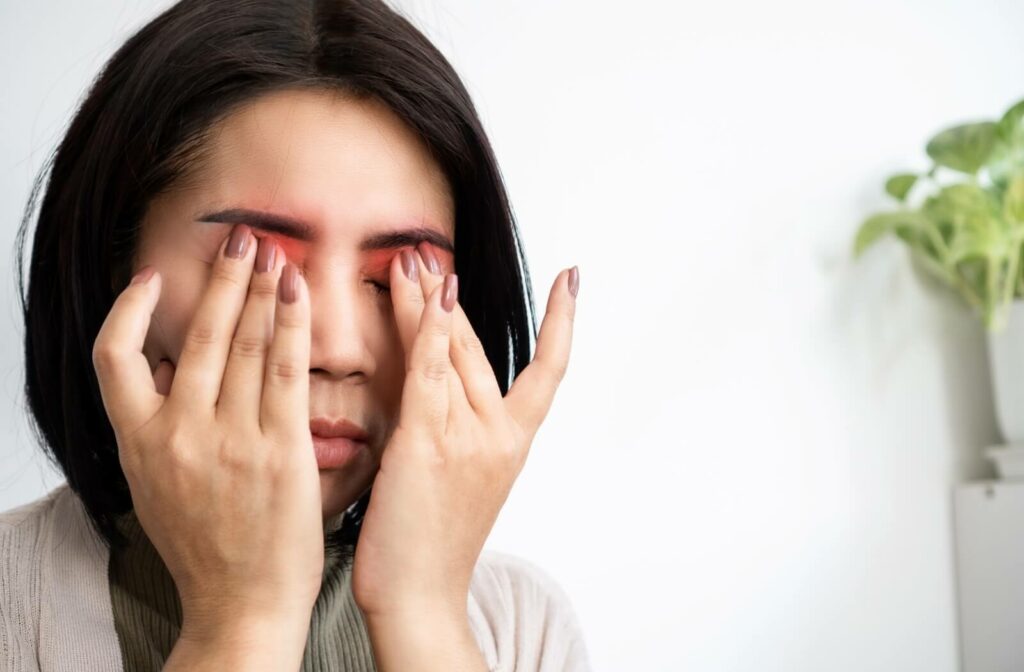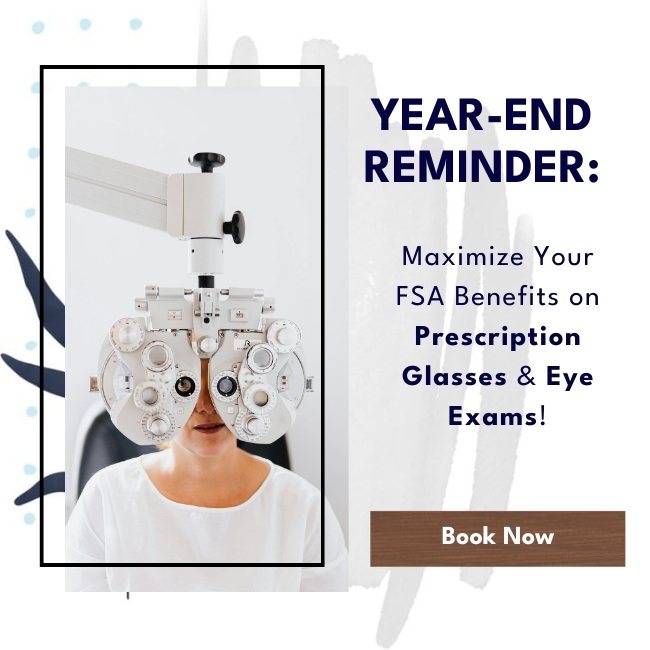Dry eye syndrome affects many Americans every year, causing discomfort, irritation, and sometimes a noticeable impact on vision. While it’s often thought of as a manageable condition, many wonder if it can lead to something more severe, like blindness.
Mild to moderate dry eye won’t cause blindness. However, severe cases of dry eye can damage your cornea, which could lead to vision loss. Luckily, there are a variety of dry eye treatments available, so you can soothe your eyes and protect your cornea from dry eye complications.
What Is Dry Eye?
Dry eye syndrome, or dry eye, occurs when your eyes do not produce enough tears, or the tears evaporate too quickly, leading to insufficient lubrication for the eyes. Tears are essential for maintaining eye health, providing moisture, nutrients, and a protective barrier.
When the tear film—your eyes’ natural moisturizer—is disrupted, it can lead to a slew of discomforting symptoms. Recognizing it early and addressing it effectively can help mitigate long-term risks.
Some common symptoms of dry eye include:
- A stinging, burning, or scratchy sensation in the eyes
- Sensitivity to light
- Redness in the eyes
- A sensation of something being stuck in your eye
- Blurred vision or difficulty focusing
- Eye fatigue, especially when using screens or reading for extended periods
While symptoms like these may seem mild at first, they can worsen over time if left untreated.
What Causes Dry Eye Syndrome?
Dry eye syndrome can occur due to a variety of factors. Each cause disrupts the production or quality of tears, leading to the discomfort many associate with the condition.
Here are some of the most common contributors to dry eye:
Aging
Tear production tends to decrease with age. This means individuals over 50 are at a higher risk of developing dry eye.
Environmental Factors
Exposure to wind, dry climates, or excessive screen use can dry out the eyes.
Medical Conditions
Autoimmune diseases like Sjögren’s syndrome, diabetes, and rheumatoid arthritis are often linked to dry eye.
Medications
Certain medications, including antihistamines, antidepressants, and birth control, can reduce tear production.
Contact Lenses
Extended or frequent use of contact lenses can exacerbate dryness in the eyes.
Understanding the underlying cause can make it easier to manage the condition effectively.
Will Dry Eye Cause Blindness?
The short answer is dry eye syndrome alone does not typically cause blindness, but severe cases can increase the risk of complications that may lead to permanent vision loss.
Some of the dry eye complications that can lead to vision loss include:
Corneal Damage
If left untreated, chronic dry eye can damage the cornea (the transparent layer covering the front of the eye). Without sufficient moisture, the cornea can develop sores or become infected, which may impair vision.
Keratitis
Dry eye can eventually lead to exposure keratitis—a condition where the eye becomes inflamed due to prolonged dryness. This can cause scarring on the cornea, impacting your vision significantly.
Higher Risk of Infection
Tears play a critical role in protecting your eyes from harmful bacteria. A lack of tears can leave your eyes vulnerable to infections, which, if severe enough, could lead to permanent damage.
Challenges in Vision Correction
Blurred or fluctuating vision due to untreated dry eye may make it harder to undergo successful corrective procedures such as LASIK or even glasses lens adjustments.
While these conditions are concerning, it’s essential to note that such outcomes typically occur only after prolonged neglect of severe dry eye symptoms.
How to Prevent & Manage Dry Eye

The good news is that most cases of dry eye can be managed to ensure the health of your eyes and prevent complications.
Simple Lifestyle Changes
- Stay hydrated – Drink enough water throughout the day to help maintain tear production.
- Take breaks from screens – Follow the 20-20-20 rule. Every 20 minutes, look at something 20 feet away for 20 seconds.
- Use a humidifier – Particularly in dry climates or during winter months, humidifiers can add moisture to the air, reducing dryness in your eyes.
Over-the-Counter Solutions
There are various products available to help relieve dry eye symptoms:
- Artificial tears – These lubricating eye drops can provide temporary relief.
- Warm compresses – Applying warm compresses to your eyes can stimulate oil glands, improving tear quality.
Professional Treatments
If home remedies and over-the-counter options aren’t enough, consider consulting an eye specialist for advanced solutions:
- Prescription eye drops – Medications like cyclosporine (Restasis) can increase tear production.
- Punctal plugs – Tiny plugs inserted into tear ducts help retain natural tears longer.
- Light therapy or eyelid massage – These treatments can address blockages in the oil-producing glands of your eyes.
When to See a Doctor
If you experience persistent symptoms that interfere with your daily life, it’s time to see an eye care professional. You should also seek immediate medical attention if you notice any of the following:
- Intense redness or pain in your eyes
- Sudden, unexplained vision loss
- Signs of infection (discharge, swelling, or fever)
Early intervention is crucial in preventing long-term damage.
Taking Control of Your Eye Health
No one should have to live with the discomfort or risks associated with dry eye. By recognizing the symptoms and addressing the underlying causes, you can reclaim clear, comfortable vision and reduce your risk of complications.
At Eyedeal Eyecare, we offer a variety of advanced dry eye treatments to help you meet your vision goals. Book an appointment with us today.




